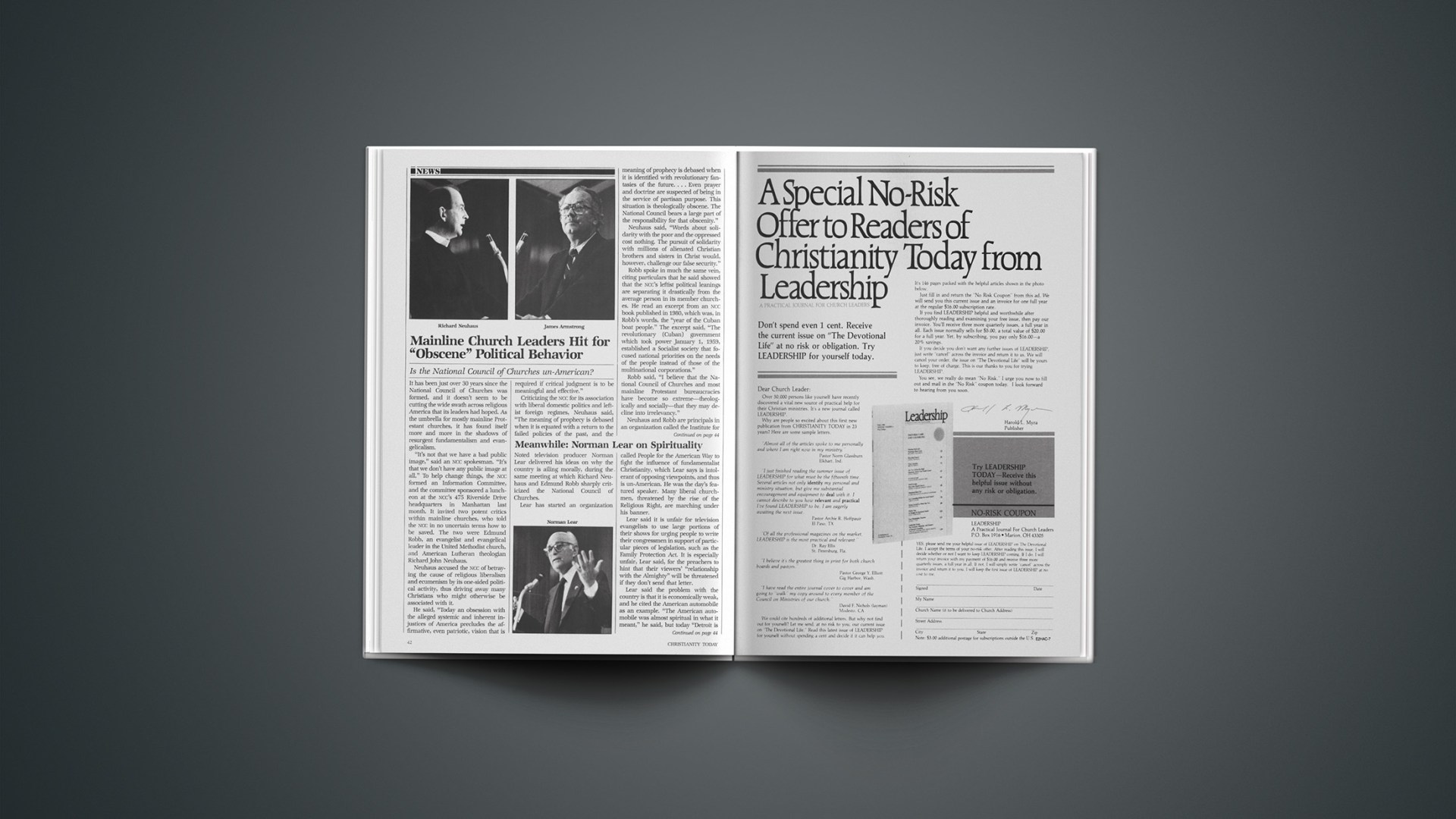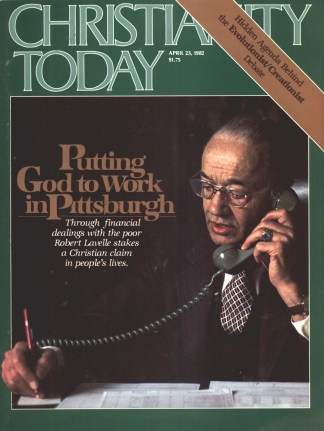Is the National Council of Churches un-American?
It has been just over 30 years since the National Council of Churches was formed, and it doesn’t seem to be cutting the wide swath across religious America that its leaders had hoped. As the umbrella for mostly mainline Protestant churches, it has found itself more and more in the shadows of resurgent fundamentalism and evangelicalism.
“It’s not that we have a bad public image,” said an NCC spokesman. “It’s that we don’t have any public image at all.” To help change things, the NCC formed an Information Committee, and the committee sponsored a luncheon at the NCC’s 475 Riverside Drive headquarters in Manhattan last month. It invited two potent critics within mainline churches, who told the NCC in no uncertain terms how to be saved. The two were Edmund Robb, an evangelist and evangelical leader in the United Methodist church, and American Lutheran theologian Richard John Neuhaus.
Neuhaus accused the NCC of betraying the cause of religious liberalism and ecumenism by its one-sided political activity, thus driving away many Christians who might otherwise be associated with it.
He said, “Today an obsession with the alleged systemic and inherent injustices of America precludes the affirmative, even patriotic, vision that is required if critical judgment is to be meaningful and effective.”
Criticizing the NCC for its association with liberal domestic politics and leftist foreign regimes, Neuhaus said, “The meaning of prophecy is debased when it is equated with a return to the failed policies of the past, and the meaning of prophecy is debased when it is identified with revolutionary fantasies of the future.… Even prayer and doctrine are suspected of being in the service of partisan purpose. This situation is theologically obscene. The National Council bears a large part of the responsibility for that obscenity.”
Neuhaus said, “Words about solidarity with the poor and the oppressed cost nothing. The pursuit of solidarity with millions of alienated Christian brothers and sisters in Christ would, however, challenge our false security.”
Robb spoke in much the same vein, citing particulars that he said showed that the NCC’s leftist political leanings are separating it drastically from the average person in its member churches. He read an excerpt from an NCC book published in 1980, which was, in Robb’s words, the “year of the Cuban boat people.” The excerpt said, “The revolutionary (Cuban) government which took power January 1, 1959, established a Socialist society that focused national priorities on the needs of the people instead of those of the multinational corporations.”
Robb said, “I believe that the National Council of Churches and most mainline Protestant bureaucracies have become so extreme—theologically and socially—that they may decline into irrelevancy.”
Neuhaus and Robb are principals in an organization called the Institute for Religion and Democracy, which was founded partially to fight the efforts of some church bureaucracies—such as the National Council of Churches and the World Council of Churches—to channel money and ideological support to nondemocratic movements. The organization sees democracy as essential to the spread of the gospel, which it views as the most fundamental freedom of a free society. The institute recently issued a position paper entitled “Christianity and Democracy” in which it stated the case for its beliefs. It was written by Neuhaus.
James Armstrong, the United Methodist bishop in Indiana and the president of the NCC, responded to Robb and Neuhaus.
He said the NCC must expose itself to such criticism, adding, “We and they must be exposed to different dimensions of truth. It is not our place here to stand up on behalf of a particular school of theology or a particular partisan point of view.”
Armstrong said that Neuhaus’s paper was a “carefully crafted endorsement of the major premises of the Reagan administration’s foreign policy.” He said the paper views the world much as Harry Truman viewed it: “The U.S. represents the Sermon on the Mount, and the Soviet Union represents the devil. There are masses of people out there who are not entranced with either one of them and who are being victimized in one way or another by the imperialism of both of them.… let’s speak a full and balanced truth.”
Arie Brouwer, general secretary of the Reformed Churches in America, also responded. He did not criticize the speeches, but rather Neuhaus’s position paper on democracy. He said the root of the paper’s error is its “obsession with totalitarianism.”
Thirty-two church denominations belong to the NCC:
African Methodist Episcopal Church; African Methodist Episcopal Zion Church; American Baptist Churches in the U.S.A.; Antiochean Orthodox Christian Archdiocese of North America; Armenian Church of America; Christian Church (Disciples of Christ); Christian Methodist Episcopal Church; Church of the Brethren; Coptic Orthodox Church in North America; Episcopal Church; Friends United Meeting; General Orthodox Archdiocese of North and South America; Hungarian Reformed Church in America; Lutheran Church in America; Moravian Church in America (Northern Province and Southern Province); National Baptist Convention of America.
National Baptist Convention, USA Inc.; National Council of Community Churches; Orthodox Church in America; Patriarchal Parishes of the Russian Orthodox Church in America; Philadelphia Yearly Meeting of the Religious Society of Friends; Polish National Catholic Church of America; Presbyterian Church in the United States; Progressive National Baptist Convention, Inc.; Reformed Church in America; Serbian Orthodox Church of Antioch.
Syrian Orthodox Church of Antioch; Ukranian Orthodox Church in America; United Church of Christ; United Methodist Church; and United Presbyterian Church in the United States of America.
Meanwhile: Norman Lear On Spirituality
Noted television producer Norman Lear delivered his ideas on why the country is ailing morally, during the, same meeting at which Richard Neuhaus and Edmund Robb sharply criticized the National Council of Churches.
Lear has started an organization called People for the American Way to fight the influence of fundamentalist Christianity, which Lear says is intolerant of opposing viewpoints, and thus is un-American. He was the day’s featured speaker. Many liberal churchmen, threatened by the rise of the Religious Right, are marching under his banner.
Lear said it is unfair for television evangelists to use large portions of their shows for urging people to write their congressmen in support of particular pieces of legislation, such as the Family Protection Act. It is especially unfair, Lear said, for the preachers to hint that their viewers’ “relationship with the Almighty” will be threatened if they don’t send that letter.
Lear said the problem with the country is that it is economically weak, and he cited the American automobile as an example. “The American automobile was almost spiritual in what it meant,” he said, but today “Detroit is not the symbol of America’s nonmilitary might. Was it because we took prayer out of schools?” School prayer is not the problem, nor is abortion, or other issues emphasized by the television evangelists, Lear suggested.
“It’s none of those things,” he continued, “but this crazy bottom-line mentality, this insistence that life is all about winning or losing.” He said he was raised in an era when winning was not the most important thing, but simply doing one’s best. Now, however, he said, “chief executive officers rape their companies to produce profits in the short run.”
He said the Religious Right has two tactics. The first is to stand with open arms and to offer simple answers to life’s most complex problems. The second is to say that people will lose their compact with the Almighty if they don’t go with the Religious Right; that Armageddon is right around the corner. “It’s fear, fear, fear.”
Lear maintained that “the future depends much more on things of the spirit than anything else,” and explained what he called the spiritual nature of laughter. He suggested one of his television programs, such as “All in the Family,” as an example. When it is being screened before an audience, and they burst out together in laughter at a particularly funny point, he said, “if that isn’t a spiritual moment, I don’t know what a spiritual moment is. Through the spiritual nature of laughing, these people were being fed an idea.”
North American Scene
Legal abortions have lessened the number of deaths and medical problems for women of childbearing age but have also raised new health concerns. That was the report of Willard Cates, Jr. of the federal Center for Disease Control, writing in Science magazine. Cates said there is a possibility that “abortion has adverse effects on future desired pregnancies” and that it may increase “the risk of breast cancer in certain women.” But he said there are conflicting research findings on those questions and that the harmfulness of abortion has not been proven. The scientist notes that the 1970s was a decade of “exceptionally rapid change,” with legal abortions jumping from 22,000 in 1969 to 1.5 million in 1980. In Cate’s judgment, the public health impact has been “largely positive.”
A New York City judge refused Sun Myung Moon’s request that his tax evasion case be heard by a judge without jury. Moon’s lawyers protested it would be difficult for the cult leader to gain an impartial hearing from jurors. The difficult task of finding unprejudiced jurors began with the impaneling of 200 jury candidates, quadruple the normal number. Eighty-three asked to be excused when the judge informed them the trial could last three months. Moon is charged with failing to report about $150,000 in personal income between 1973 and 1975.
A National Broadcasting Company executive said Donald Wildmon made an “insane statement” when he accused the network of helping pay for a satirical supplement in the December issue of Playboy magazine (CT, April 9, p. 74). Wildmon, head of the Coalition for Better Television, had said NBC helped sponsor an eight-page section called “Prayboy.” The section mocked conservative Christianity. But the NBC executive said the network’s only connection to the ad was that RCA, NBC’s parent company, paid for a Selectavision promotion. The network bore no responsibility for that, she said.
Evangelist Billy Graham again emphasized disarmament when receiving the prestigious Templeton Foundation Prize for Progress in Religion. Graham said the world “stands on the verge of what could be a great conflagration.” He said the only hope for “universal nuclear disarmament” was to “trust in God.” Graham was praised by a diverse representation of religious leaders at the reception of the $200,000 award. Rabbi Marc Tanenbaum, of the American Jewish Committee, called the evangelist “the greatest friend of the Jewish community … in the entire Christian field in the twentieth century.”
Southern Baptists recorded increases in all areas except baptisms for 1981, a new report shows. Baptisms, according to denominational statistics, dropped 24,134 from the previous year to a 1981 total of 405,608. Total membership of the convention now stands at 13,789,580, with 36,079 congregations. It is by far the country’s largest Protestant denomination.










